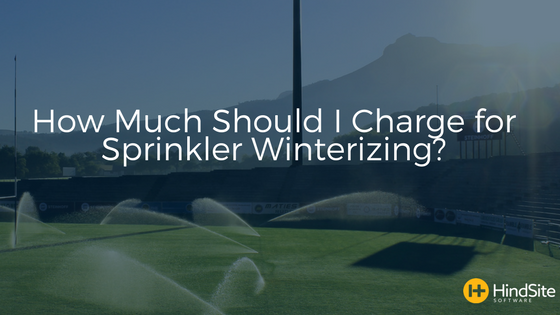By Harold Fox
This post originally appeared on Harold Fox's blog and is reprinted here with permission.

Each fall in the parts of the country that require irrigation systems to be winterized to prevent freeze damage, a lot of irrigation outsiders jump into the service to make a fast buck by price cutting. Did you hear what I said? Fast buck and price cutting do not go together in the same sentence because they are antagonists to one another.
[READ: Irrigation Business Essentials]
To make matters worse, too many small irrigation contractors have the same philosophy in thinking a lot of cheap sprinkler blow outs make them money. Or these contractors think they don’t have overhead like larger companies and they can reduce prices as a result.
I can say with certainty because I tried it when I was in business and have heard from other contractors, people buying cheap services are just plain cheap. They do not care about service, quality or professionalism. Almost none will ever make a real service customer or service plan purchaser.
Debunking Low or No Overhead
All contractors buy trucks, cell service, insurance, gas, materials, labor, marketing, etc, from the same sources. Get the thought out of your head, that your costs are way lower than contractors x, y and z. They are not. Large companies will have more overhead in total dollars than smaller contractors, but not necessarily more overhead costs per man hour than small companies. If you have one office assistant and 500 accounts and a larger company has 2 assistants for 1800 accounts, the larger company has lower office labor costs. Sure big companies use more paper, postage and marketing, but those costs are spread over a much larger base. In some cases, a small contractor's cost of production is actually higher than a larger company.
What To Charge For Winterizations
In the early to mid 70s, we charged $45-$47.00 for an average residential sprinkler blow out that may have been 6-7 zones in southern NJ. Larger residentials and commercial systems were more. With the use of an inflation calculator at http://www.usinflationcalculator.com/ , I can see that $47.00 irrigation winterization in today’s dollars should be $190.00.
Today our routes are better, and we do more stops in a day. So a 1-6 zone blow out shouldn’t be sold today for $35-$65. Today we need to get a minimum of $75.00 or more, no matter if you are a large or small contractor. Unlike some manufactured products or services, irrigation winterizing is still a labor and equipment intensive job that advances in technologies can not do much to help. Yes there is field service software to improve office productivity and routing, plus GPS and remote controller operation for techs, but none of that reduces costs enough to justify the low prices seen in past years.
No Way You Say
Customers won’t pay more. Really? Do they have a reasonable option to not winterize their system?
- Fact #1 - Sprinkler systems are owned by people that have discretionary income. That means they have more money to spend than what they need for basic food, clothing and shelter. They can afford luxuries or better quality goods and services in life.
- Fact #2 – They must have their systems winterized. So why are you not making serious money for this service? We did relatively speaking, in the 70’s and 80’s. Prices need to be at real world cost + profit levels for today.
Still Not A Believer?
If you are an owner operator, how much do you pay yourself? $21/hr for a licensed owner or a veteran, high skilled tech might be the jumping off point. That’s $840/week, plus overtime. Yes overtime, because if owners were working for a bigger company, they’d get 1-1/2 times over 40 hrs. That makes a 12 hour day worth $294.00 in wages. Add 25% for payroll and business insurances, taxes and such. 50% more for overhead like cell phone, postage, computer, storage space, marketing, software, paper, business licenses, dues, bad debt, utility bills, maybe parking space or a shop, etc, and you have about $515.00 in costs. Add $90.00/day for a truck, compressor, fuel, maintenance, insurance for a total of $605.00 a day in costs. That is 11, $55 dollar blow outs to make a wage, and NO PROFIT like corporations earn, and no money for your retirement, rainy day or future company investment. No money to ever grow your business. OUCH! A better guess is that for however long your blow outs go, you will only average 11-12/day for the season. So it costs about $55.00 and up, to do a blow out.
Lets say you have 200 to do and charge $75. $20.00 profit per job x 200 = $4,000. Not outrageous and not impossible. All you have to do is price the jobs profitably and ask for it. Irrigation system owners have no choice but to winterize. Remember that. So let them leave you if they don’t like it. Meanwhile someone else’s customers will be calling you and find out they quit their service provider and now must pay you the same price they quit over.
It Can’t Cost What You Say To Do A Winterization
There is also a perception that blow outs are cheap to perform. Use the rental price of a truck and a 185 cfm compressor for the day. That’s about $90. Add 6-8 gallons of fuel for the whole rig. We know that 12-15 residentials spread around towns in a day is a full load. If you have no shows, it may be 8-9 jobs. We know from larger companies that it takes a full time office person for every 2.5 to 3 trucks on the road winterizing. That’s right, about 2.5 to 3 hours of work behind the scene, making appointments, answering calls, handling money, billing etc., just for one full time truck on the road. So that 8-9 hr day you work becomes a 10.5-12 hour day. You need to compensate yourself for all of your hours worked, not just the hours at the client’s curb.
What’s Wrong In The Irrigation Industry
You are self employed and control your own pricing. Are your retirement accounts full? Why do you need health coverage from your spouse? Why do you worry about how you are going to make it through the winter? You work more hours March into December than many people work in 12 months. You work cold, wet, hot and hard long hours, and have investments in your company, and you take risks. That should yield you a big reward, not merely a wage.
As I see this, there is a lack of confidence in self, and contractors are not placing the same value on themselves as clients do. When it was 98 degrees and a head was broken or a zone not working, you were valuable, because people think their property and appearance are valuable. Don’t forget that when you price your work. This is work that people can’t do themselves, or don’t know how to do. So the clients have a need, while you have knowledge, work, invest and take risks. That is an ideal business situation.
Fear of rejection and price criticism are reasons much work is not priced high enough to make a good living. It’s imagined the clients won’t pay. Yes they will pay if you give value, except for a very small percent that you won’t miss. You and I have paid whatever was asked at the gas pump and grocery store, at the supply house or insurance agency haven’t we? How about buying a 6 pack of beer that keeps going up? A ½ gallon of ice cream (64 oz) is now 48 oz, and we keep buying. The list is endless of how we keep buying bigger prices and smaller quantities. We don’t need ice cream or beer any more than we need irrigation. But consumers like it and are going to keep buying because they are afraid of what their properties will look like without it. Fear is a great motivator. Consumers are both inherently lazy and loyal as well, and will seldom shop the small stuff if they like you. If you price closely in our industry like roofers and gas stations, based on real costs and decent profit, you can prosper.
How Can I Profit
Your pricing needs to be determined by your cost calculations and a profit markup Your price should wind up close to highly profitable competitors, because your costs really are nearly identical, not because you are price fixing. Here’s the math. You are blowing out 100 systems for $55.00 each, a common price beside the road, = $5,500 in sales. Raise the price to $75 and you only have to do 73 blow outs to earn the same $5,500. Do you really think 27% of your customers would quit if they liked you, and you have treated them right? Where would they go if everyone else was close to $75 for the same service? Would you really care if you did 27% less work, at 27% less cost for the same amount of profit? If you do 85 @ $75 you sell $6,375 or 16% more money for 15% less work. Give yourself a raise guys, because the customer will never, ever tell you to raise your price or you are not making enough money.
Avoid
Another common mistake is to apologize for raising your price, or try to explain or justify the price. Hogwash. Close your lips and take the money. No one apologizes or justifies the price of anything to you or me. They raise the price and move on. You should too. If pressured, a simple “we need it to stay in business” will do.
Follow The Leader
Utility companies are a prime example of how to survive. When they get hit by an event that cuts their sales such as water restrictions or oil shortage, they raise prices to maintain their revenue stream and profit. So should the irrigation industry. When times get better, don’t be fast to drop them either.
Help On This And Many Other Management, Cost And Pricing Issues
Some basic download cost and price calculating tools are available on my website, www.haroldfoxllc.com/profit-tools.
Harold Fox, owner of haroldFOX LLC, is a former landscape business owner for 43 years and past President of the Irrigation Association of NJ. You can e-mail him at Harold@haroldfoxllc.com or call 850-972-9301 with questions or comments.








